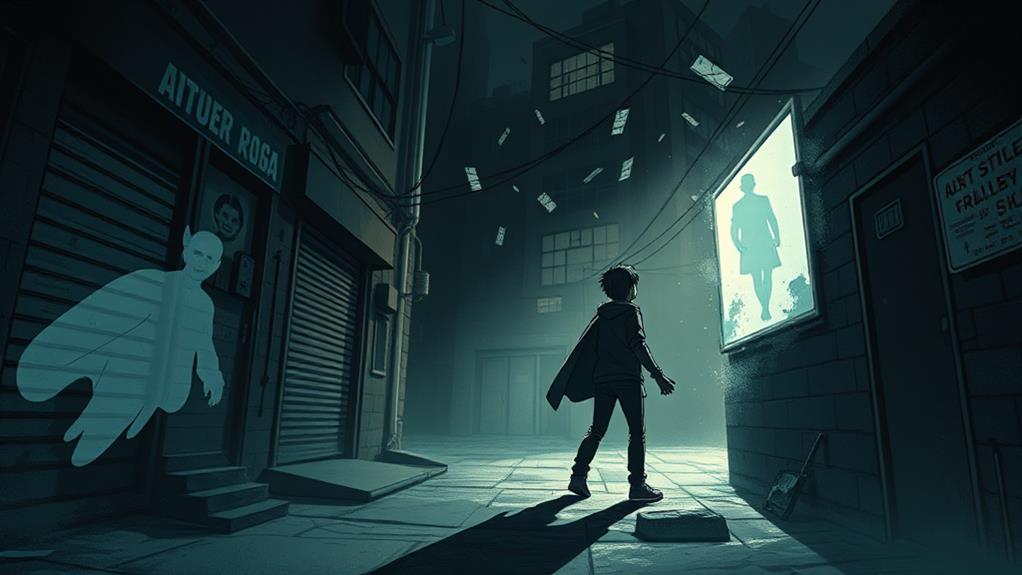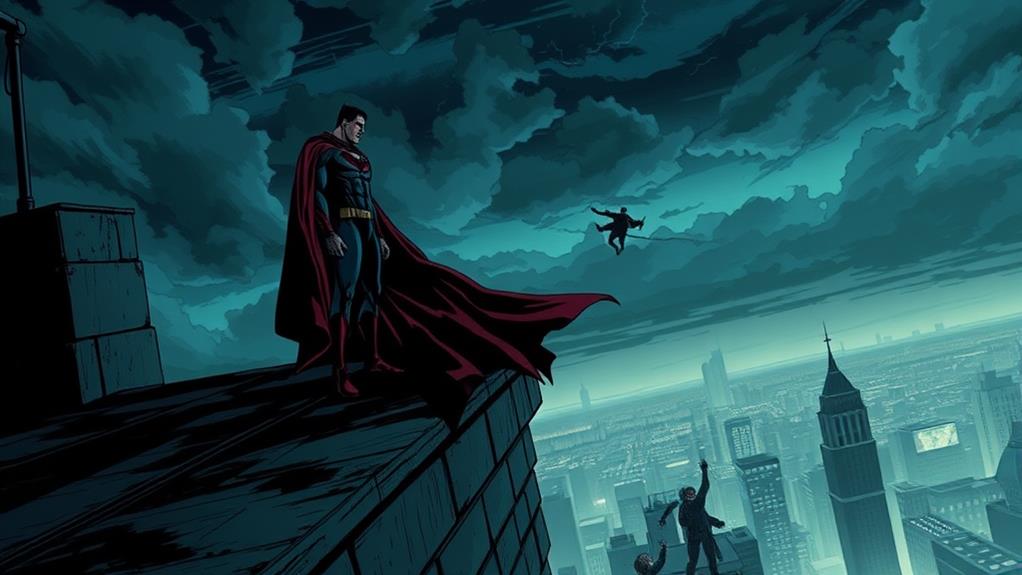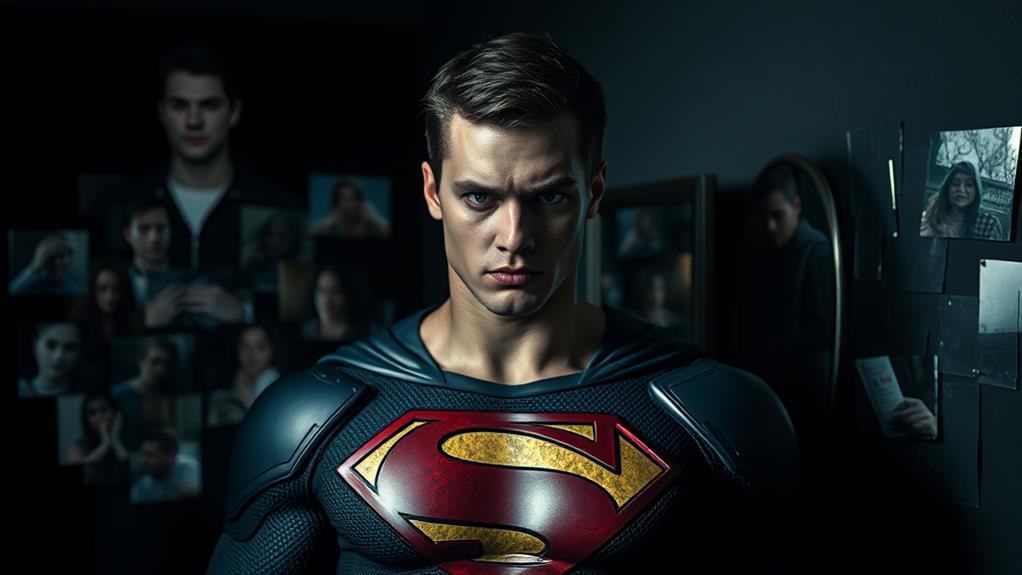
Superheroes have complex psychological profiles because they grapple with traumatic experiences, balancing dual identities, and facing moral dilemmas. Their origin stories often root in personal trauma, like Batman's witnessing his parents' murder. They juggle their superhero lives with personal ones, leading to inner conflict and isolation. Making tough moral decisions and managing strained relationships add to their psychological complexity. Despite their powers, superheroes also deal with mental health issues like anxiety and depression. Their quest for meaning further deepens their characters. There's so much more to discover about what shapes these extraordinary individuals.
Trauma and Origin Stories

When you explore the world of superheroes, it's impossible to ignore how trauma shapes their origin stories. This emotional turmoil often serves as the catalyst that propels ordinary individuals into extraordinary roles. Think about Batman: witnessing his parents' murder ignited his crusade against crime. This traumatic event fuels his relentless pursuit of justice, transforming Bruce Wayne into the Dark Knight.
You see similar patterns in characters like Spider-Man. Peter Parker's guilt over his uncle's death compels him to embrace his newfound powers responsibly. Trauma isn't just a backstory element; it's the driving force behind their actions and decisions. When you look at Wolverine, his painful past and constant loss shape his fierce, often solitary nature.
These traumatic experiences aren't just plot devices. They add layers to the characters, making them relatable and multidimensional. You understand their motivations better, empathizing with their struggles and triumphs. Trauma humanizes these heroes, reminding you that even those with superhuman abilities face emotional battles. It's this blend of vulnerability and strength that makes their stories compelling, drawing you into their complex psychological worlds.
Dual Identities
Balancing dual identities is a cornerstone of many superheroes' lives, often creating a compelling inner conflict. You see, superheroes like Spider-Man or Batman constantly juggle their heroic persona with their everyday self. This duality isn't just a narrative device; it's a psychological challenge. Imagine having to switch from being a regular person with everyday problems to a larger-than-life figure with immense responsibilities.
When you're Peter Parker, you're worried about school, Aunt May, and paying the bills. But as Spider-Man, you're swinging through the city, fighting villains, and saving lives. The mental strain from maintaining these two identities can be overwhelming. It forces you to hide your true self from friends and loved ones, creating a sense of isolation.
Moreover, the dual identity often serves as a coping mechanism. Bruce Wayne channels his grief and anger over his parents' death into his alter ego, Batman. This allows you to explore different facets of your personality—from vulnerability to strength—without fully confronting the emotional turmoil.
In essence, managing a dual identity makes you constantly vigilant, always on guard, and perpetually torn between two worlds. This inner conflict is a key reason why superheroes have such complex psychological profiles.
Moral Dilemmas

Managing dual identities isn't the only psychological hurdle superheroes face. You often find them grappling with intense moral dilemmas that test their ethical boundaries and values. These challenges force them to confront complex questions about good and evil, justice, and personal sacrifice.
Consider the following moral quandaries:
- Choosing who to save: Imagine a burning building where a superhero can only save one person—do they rescue a loved one or a group of strangers?
- Using lethal force: Some villains pose extreme threats, but should a superhero kill to protect others, or find another way to neutralize the danger?
- Vigilantism vs. Law: Operating outside legal boundaries can achieve quicker results, but does it erode the rule of law and create more chaos?
- Sacrificing personal happiness: Superheroes often face choices between their personal desires and their duty to protect others—what's the right balance?
These moral dilemmas add layers of complexity to a superhero's psyche, making their stories richer and more relatable. You see them struggle with the same ethical issues you might face, albeit on a much grander scale, which humanizes these otherwise extraordinary characters. This internal conflict often stems from their unique superhero origin stories, which ground their powers and responsibilities in deeply personal experiences. These origins not only shape their sense of duty but also serve as a lens through which they view right and wrong, adding depth to their character arcs. As a result, their journeys become less about simply defeating villains and more about navigating the gray areas of morality.
Relationship Struggles
Maneuvering relationships is a significant challenge for superheroes, often complicated by their double lives and constant peril. When you're saving the world by night and trying to maintain a normal existence by day, the lines between personal and heroic responsibilities blur. Trust becomes a major issue. How can you let someone into your life when revealing your true identity could put them in danger? The fear of losing loved ones to your enemies is ever-present.
Balancing time is another struggle. Relationships demand emotional and time investments, but your superhero duties are unpredictable and urgent. Imagine planning a romantic dinner only to dash off mid-conversation because a crisis erupts. Such interruptions can strain even the strongest bonds.
Moreover, the moral weight you carry affects your relationships. You grapple with ethical decisions that can be hard for others to understand. It's exhausting to explain why you had to let a villain go or why certain sacrifices were necessary. These complexities often lead to isolation or breakups. Fundamentally, the very nature of being a superhero creates a labyrinth of relational challenges that are hard to navigate, making meaningful connections rare and fragile.
Mental Health Issues

Maneuvering the labyrinth of relationship struggles, superheroes also face an equally intimidating challenge: mental health issues. You might think their superpowers make them invincible, but their minds are often as vulnerable as anyone else's. The constant battle between their heroic duties and personal lives can lead to a range of psychological problems.
Consider the mental toll of living a double life. Balancing their superhero identity with a civilian persona is exhausting and can lead to:
- Anxiety: Constantly worrying about their secret identity being exposed or loved ones being harmed.
- Depression: Feeling isolated and misunderstood, despite their incredible abilities.
- PTSD: Traumatic experiences from battles and loss can haunt them indefinitely.
- Obsessive-Compulsive Behaviors: Perfectionism and the need to control every situation can become overwhelming.
You can see how these mental health issues complicate the lives of superheroes. They face immense pressure to save the world while managing their own psychological well-being. It's a stark reminder that even the mightiest heroes need support and understanding. Recognizing their struggles with mental health humanizes them, making their stories more relatable and compelling.
Search for Meaning
The quest for purpose often drives superheroes as much as their superpowers do. You'll find that many heroes initiate their journeys not just to vanquish evil, but to find meaning in their extraordinary lives. Batman, for instance, isn't just fighting crime; he's searching for a way to cope with the trauma of losing his parents. This search for meaning adds layers to his character and makes him relatable.
You can see this in Spider-Man too. Peter Parker's mantra, "With great power comes great responsibility," isn't just a catchphrase. It's his guiding principle, giving him a sense of purpose amid the chaos of his dual life. His struggle to balance his personal life with his superhero duties is a constant quest for meaning.
Even in group settings like the Avengers, the search for purpose is evident. Each member has their own reasons for joining the team, whether it's redemption, duty, or simply belonging. They're not just saving the world; they're seeking significance in their actions. This search for meaning makes their stories compelling and their struggles palpable, allowing you to connect with them on a deeper level.
At a Glance
You've seen why superheroes aren't just caped crusaders—they're deeply human. Their trauma fuels their fight, dual identities keep them grounded, and moral dilemmas test their integrity. Relationships? They're as tangled as their webs. And mental health? Let's just say, even heroes need a little couch time. Ultimately, they wrestle with their purpose, just like you and me. So, next time you turn that comic page, remember: their struggles are the ink that colors their heroism.






